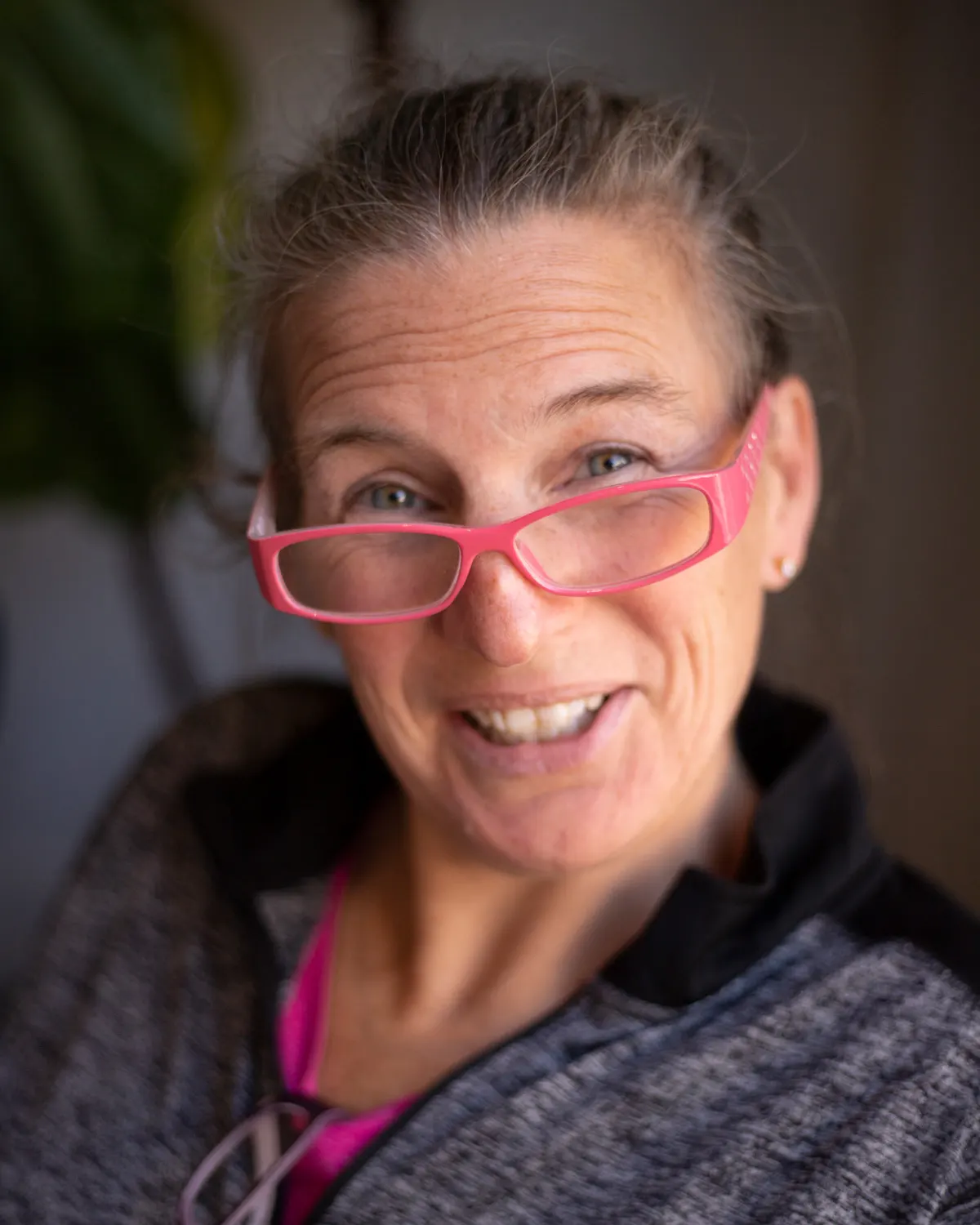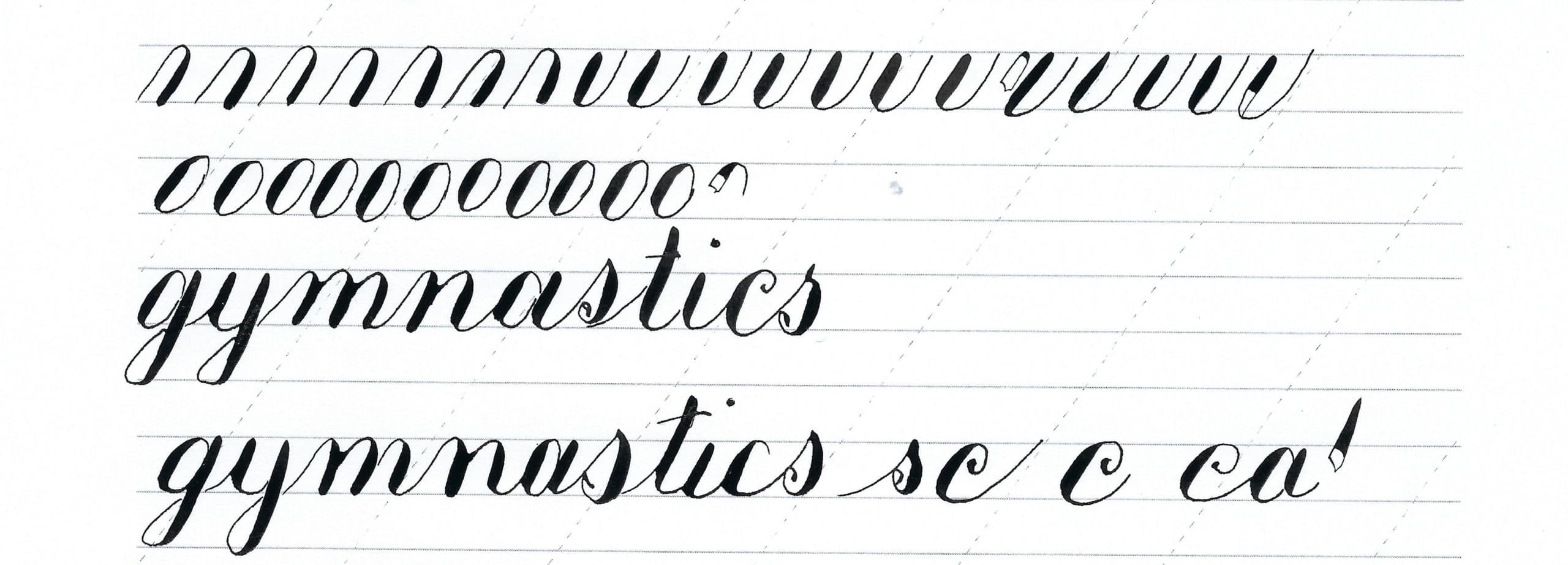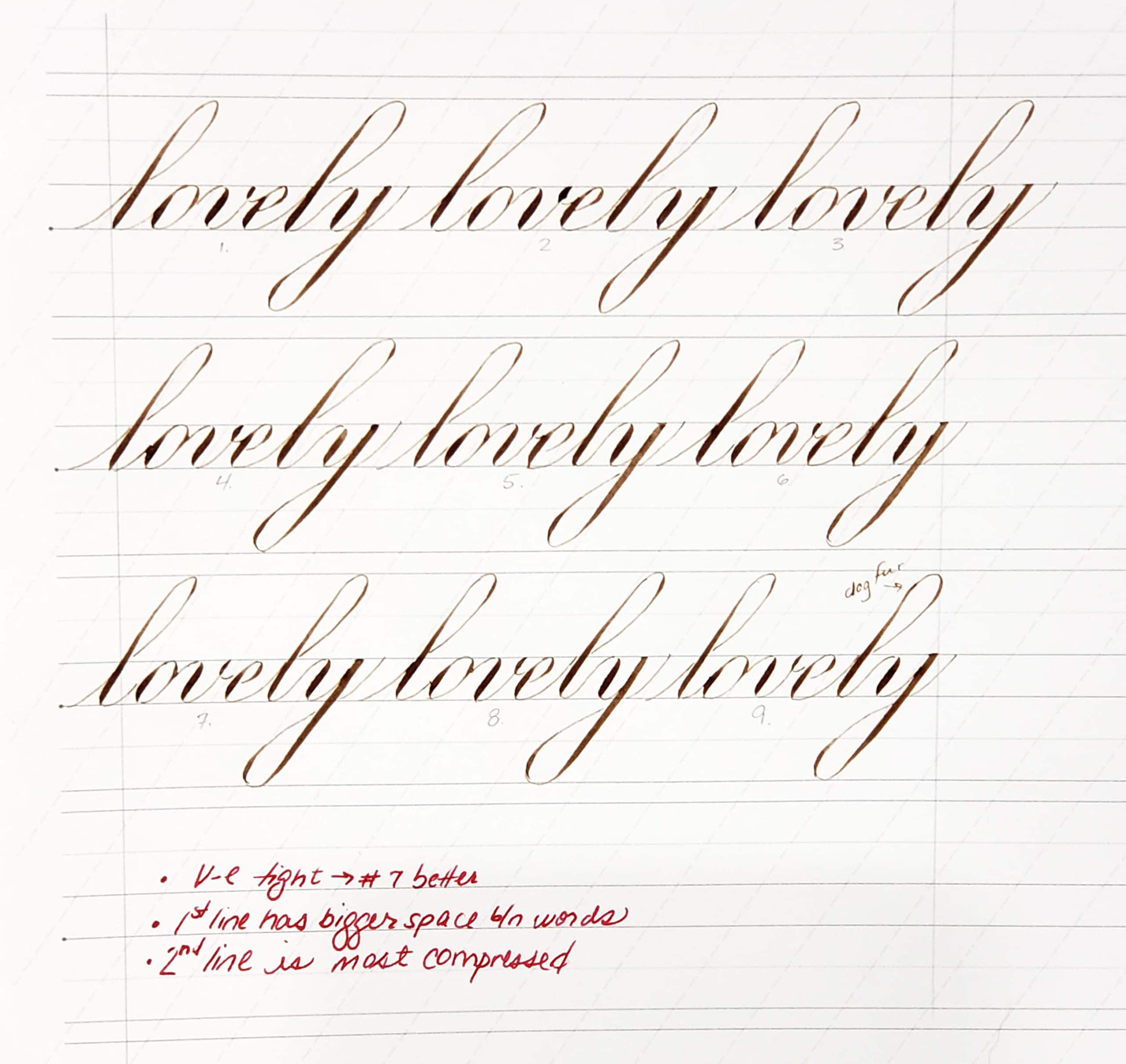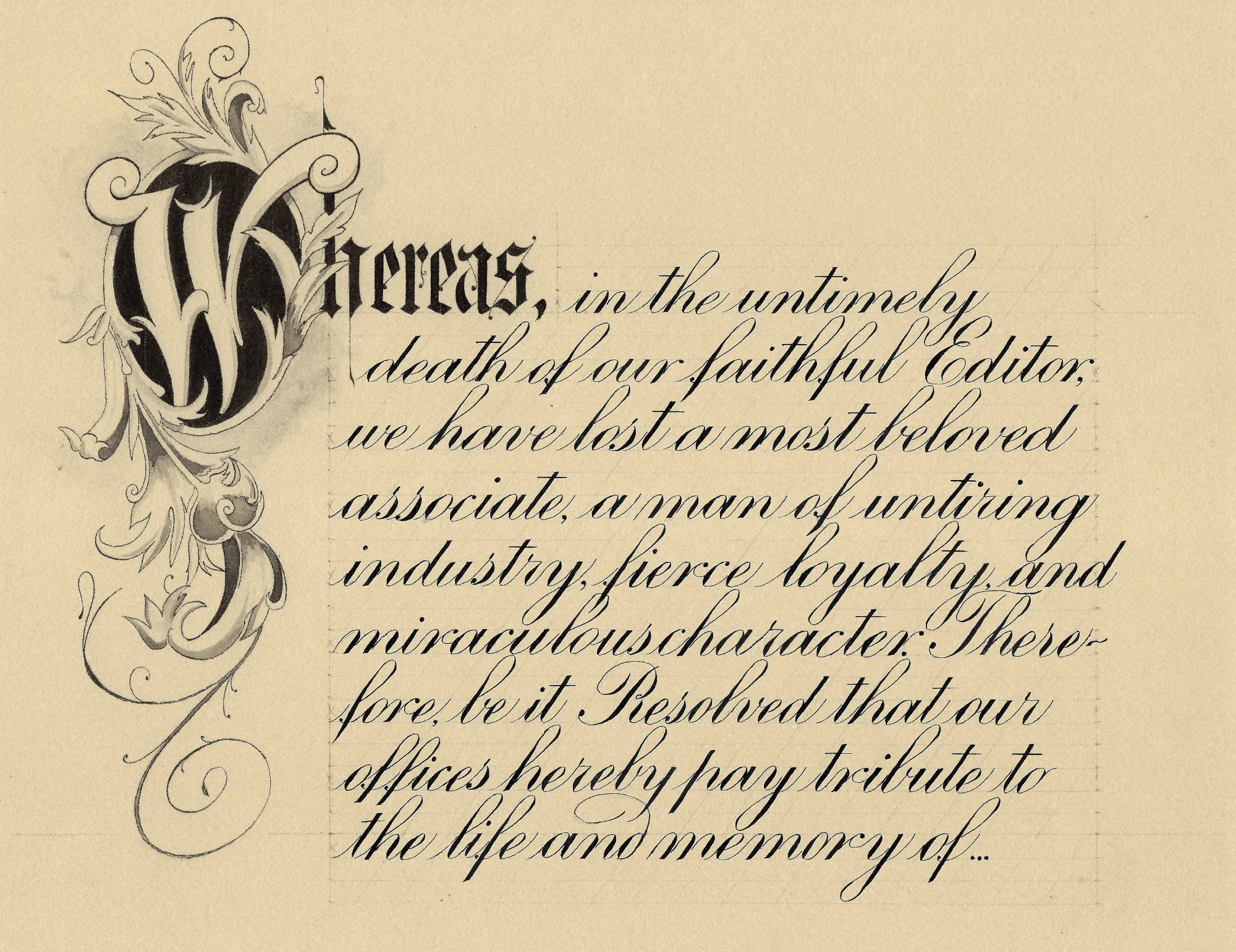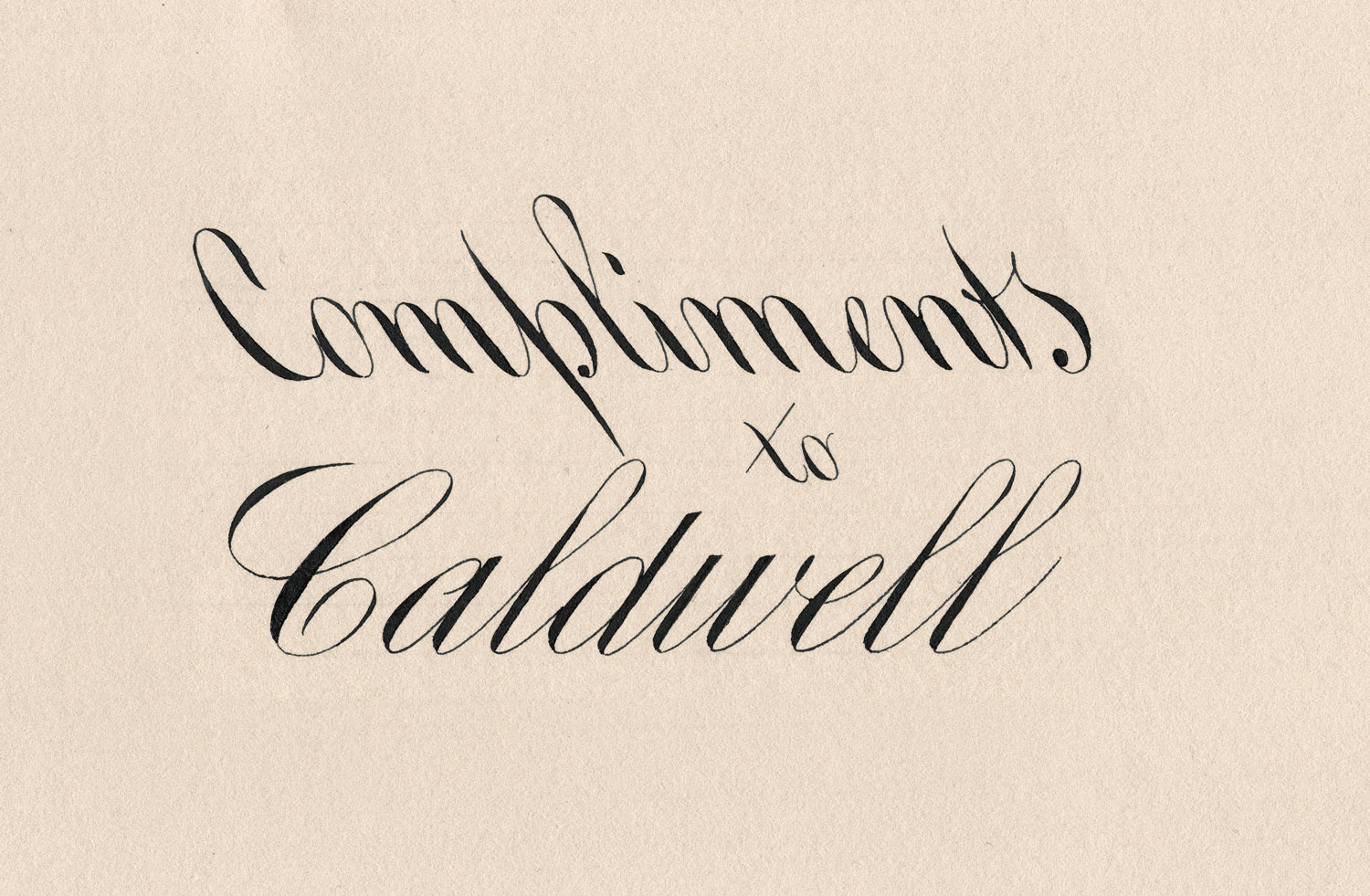Student Feature: G. N. Caldwell
Written on February 28th, 2019 by D. T. Grimes
Gretchen Caldwell is a mother, biochemist, paramedic, dog-trainer, and Dreaming In Script Merit Alum. Over the last six months, We’ve watched Gretchen struggle and grow with a number of different projects and skills as she has progressed into quite the penman! We’re proud to present a student feature about her progress and thoughts on her calligraphic journey and hope that it inspires and encourages those of you working on developing your own skill. Gretchen is a generous, humble, and enthusiastic friend and we feel very fortunate to call her one of our hardest-working students.
You can learn more about Gretchen’s calligraphy on her Instagram: @gretchen.caldwell.
Hey Gretchen! Can you tell us a bit about yourself before you started calligraphy?
Before I started calligraphy, I was a biochemist for several years before going into working full time as a paramedic because corporate America really isn’t my thing. After I had my daughter I stayed home and started walking people’s dogs which led me into dog breeding and training.
My kids are both gymnasts now, so I work part-time at the gym where my daughter competes, and I split the rest of my time between driving back and forth to different gymnastics events and lately practicing calligraphy!
When did you first get started with calligraphy and how did you find the time? Sounds like you’re pretty busy with all of the back and forth that comes with being a mom, chauffeur, and holding down a job at the gym.
I saw somebody post a video of Suzanne Cunningham on Facebook in late 2017. I don’t really know why it was posted on my wall, but it was definitely fascinating. I decided that I wanted to learn how to write like that, and then in January 2018 there was a pointed-pen calligraphy workshop being offered in Boston. So I decided to take it so that I could learn to write like Suzanne. haha.
Gretchen’s first attempts with calligraphy. 2018.
So you started from the perspective of wanting to learn about pointed-pen? That’s kind of unique! Did you know anything about it before that workshop?
I didn’t know the first thing about pointed-pen. I didn’t even look anything up before going to the workshop. I just showed up with a pen in my hand! I read somewhere that the Hourglass Adjustable Oblique holder (from Paper & Ink Arts) was recommended and that’s what I picked up for my first six months or so.
Did you consider yourself a ‘natural’ after that first workshop? Did it leave you feeling inspired or encouraged?
I was excited leaving the workshop, and no, absolutely NOT a natural. I am not gifted with artistic ability, but I can generally follow clear instruction and enjoy acquiring new skills. Suzanne’s work was still super inspiring and kept me wanting to learn more. At that point, I wasn’t on Instagram, so the workshop was really my only exposure besides that video of Suzanne’s writing. I was excited to go home and try to apply some of the things I learned in the workshop. I really liked the instructor’s writing and I remember being excited to go home and get some practice in.
So how did you get into Instagram calligraphy?
I didn’t understand the point of it. How is different than Facebook? The instructor, Liz, had mentioned to post things and tag her as we worked on our practice. I was like: “tag you in what?” which led me to Instagram where I started to learn about different hashtags and calligraphers and it all started to take shape from there.
Knowing a bit about your story, I know you eventually found your way to Younghae’s class. When you started that, were you sure that you wanted to study Copperplate?
When I took that in-person workshop, I learned modern calligraphy, but the instructor talked a bit about Copperplate, and I asked if there was any local instruction that I should look into. I was told that there wasn’t a regular class on that topic in the Boston area which led me to search it out online. That’s where I found out about Younghae’s class. And yes, after searching more online following the initial workshop, I knew that Copperplate was what I wanted to learn.
What was your biggest takeaway from Younghae’s?
I learned that there were different styles and different approaches to Copperplate. I learned that it was not as unified as a script as I thought it was. It’s somewhat individualized to the person who is writing it!
Gretchen’s progress prior to DIS. 2018.
After Younghae’s course but before DIS, were you focused on moving in a specific direction? What questions did you still have after your first online learning experience?
After Younghae’s course, life was a bit busy for a while. I only got to practice about once a week at best. I can’t say that I had specific questions, as it was a good example of “not knowing what I don’t know.” However, I did know that I wasn’t happy with my abilities and that I wanted further instruction. I wanted to know more about how to correct the errors in my strokes. I could see that they were incorrect, but couldn’t figure out what I was doing incorrectly.
There was still nothing available locally, but I had discovered and started following Nina Tran’s live sessions pretty consistently. I had heard your name mentioned a couple of times and I started to learn that you were considered an expert on Engrosser’s Script—I didn’t understand the differences between Engrosser’s Script and Copperplate at the time, and because of that, I wasn’t really sure that your course was something I even wanted to take, since I thought they were so similar. Dr. Joe, Suzanne, Nina….the people I admired all spoke so highly of you, so I thought I’d give it a shot and see what it was all about!
Once inside Dreaming In Script, you’ve obviously done an amazing job all the way up into the more advanced projects, but what were your first thoughts about the beginning of the course?
When we first started making the Principal Shades, I thought: “Oh okay, no problem, I know how to do these!” because I’d taken Younghae’s course. But I was really surprised at how different and how much harder it was to make them to the specifications that you’d asked for based on your historical observations. So that was more of a struggle than I expected to be. I thought it would be a “course on writing,” but it has turned into so much more. DIS is a warm group of friends who are passionate about learning, and very willing to support each other through struggles. I think the biggest surprise is that DIS caused me to give up one of my beloveds: coffee! 🙂 It’s been a month, and since I stopped drinking coffee, I don’t have problems with shaky hands.
One of Gretchen’s first DIS homework assignments. 2018.
In terms of the math related to The Writing Interval and spacing, the specifics of the stroke formations, and the reasons why certain things are done, this is a very analytical course, different than anything else I’ve seen online. But that works brilliantly for me because my mind isn’t artistic, it’s analytical. There’s a clear reason for everything that is asked of the students and having that reason, and recognizing all that it’s based in really leads to understanding why something needs to be the way you present it.
Is there a tendency for the way that I explain ES to become convoluted?
No, I haven’t thought that. There have been times when I thought I knew what you were talking about and I probably didn’t pay as close attention to it the first time through. That’s the beauty of the course: you can go back and re-watch the videos, re-read the essays and go: “something’s not right about this, what is it?” and find an important detail that I didn’t catch the first time through. That really ties things together nicely for me.
Gretchen’s ‘Nameplate’ assignment, DIS. 2019.
How has your adoption of the DIS model for Engrosser’s Script applied towards your ability to enjoy American Penmanship as a larger spectrum?
As someone who has never really done well with history, it’s been really interesting to have the history brought alive and made to be interesting. That’s resulted in a desire to explore early 20th century American writing further. Many of the people that I follow on IG for Engrosser’s Script also seem to enjoy Business Penmanship and since I had been reading so much historical material because of your course, I started looking into that and I’m now working on getting started in that too!
A sample of Gretchen’s body script, DIS. 2019.
What are your goals with BP and ES? Do you feel that BP fills a gap that ES leaves open?
I see them as really different, so I don’t think Business Penmanship will fill in something that Engrosser’s Script leaves open, but I DO think that it will help me to be a more well-rounded or ‘fleshed out’ penman. I find them to be complimentary. They serve different purposes. One would not fill a beautiful Resolution with Business penmanship, nor keep Accounting books in Engrosser’s script. I also really look forward to using it for my dog walking clients where I have these little notebooks that I leave notes about the walk for the owners to read. I’m excited to get to use it!
What would you say are your mid-length goals? 3-5 years from now with calligraphy. What are you up to?
I haven’t really looked that far down the road yet. I’d love to use it as a service for people, to use it in a philanthropic way. Surely I’d love to get paid to do it, but I’m not yet sure what direction that will be. I know that I don’t want to do weddings. I’m not really sure, but somehow I want it to be a part of my daily life.
What piece of advice would you give to beginner Gretchen after that first workshop to save yourself some time?
Find one way that works for you and stick with it for the clarity of instruction. Trying to follow too many people or methods at once becomes confusing. If you find something that works for you, stick with that and stay focused for a while.
If you had one piece of encouraging advice to give to potential students of calligraphy based on your experience so far, what would you leave them with?
I definitely have low points frequently where I doubt my ability to make the basic strokes and get discouraged like maybe this isn’t for me or I don’t have the motor skills to do this, but there’s something about working through the strokes and the writing that is relaxing and it’s something that a lot of people can’t do. That in itself is motivating to keep going. It’s different, and most people out there don’t see the errors that I can see. As frustrating as it can be I love it and I don’t want to stop. DIS has brought me some treasured calligrafriends, and they really help push through the self-doubt. I practice every day, and I would miss my practice if I quit. To someone who is struggling, I would say: Keep pushing through it. If it brings you joy, it is worth pushing through. There are people online who I see that are struggling and I try to come alongside them and show them my prior work and my work now and say ‘If I can do this, you can do this, because I definitely don’t consider myself an artist, this is all skill and mechanics.”
Learn more about Gretchen on Instagram, and be sure to send her a message about her work. She loves to talk shop and has become one of the most knowledgable students in the entire DIS program. Bravo, Gretchen!
– Editor
